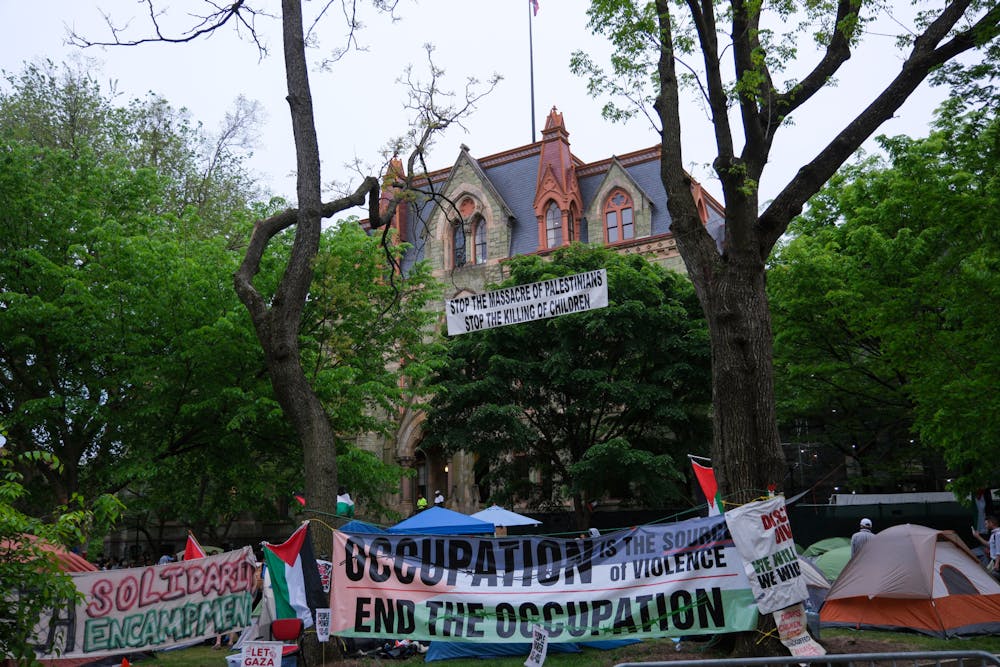Follow more live updates from the 'Gaza Solidarity Encampment' here.
Penn administrators have “repress[ed]” nonviolent protest” and threatened to clear the pro-Palestinian encampment on Wednesday, the Executive Committee of the Penn chapter of the American Association of University Professors alleged in a Tuesday letter.
In the letter — which was sent to Interim Penn President Larry Jameson, Provost John Jackson Jr., Vice Provost for University Life Karu Kozuma, the Faculty Senate tri-chairs, and the chair of the Committee on Open Expression — the committee outlined several alleged “abuses” of Penn’s open expression guidelines and called for a new system to “interpret and enforce" the guidelines.
“We are witnessing an Orwellian situation," the statement claimed.
AAUP-Penn also criticized the University's "acts of intimidation" as potential precursors to a police response or other incitement."
"It is the university administration, with the lamentable assistance of the Committee on Open Expression, that is creating a crisis," the group wrote. "Its fabrications, misrepresentations, and threats … are acts of escalation that are creating fear on our campus."
The statement criticized the “exclusive power” the vice provost for University life has “to decide when the guidelines have been violated.”
“The unilateral power of VPUL to interpret and enforce the Guidelines is indicative of the general problem of university governance that we have seen this year,” the statement read. “By design, faculty, staff, and students do not have real power to make and enforce university policies to protect our rights to academic freedom.”
RELATED:
Petition calling on Penn to not suspend encampment members receives over 1,000 signatures
Fire marshal searches Penn's pro-Palestinian encampment for fire hazards, alcohol, drugs
Penn’s open expression guidelines state that the vice provost has the “authority to determine if the guidelines are being violated by any member of the University community.”
Moving forward, the committee wrote, “the administration must end its attempts to shut down the encampment on specious grounds.”
The statement also called for the formation of a new elective body to enforce the open expression guidelines.
“The power to interpret and enforce the Guidelines on Open Expression must be taken away from VPUL and transferred to a new elected body consisting of faculty (tenure-track and non-tenure-track), staff, and students, all elected at large,” the statement said.
In a section titled “This Week’s Abuses of the Guidelines on Open Expression,” the executive committee alleges violations of Penn’s open expression guidelines over the past three days.
On April 28, the statement alleges, the University violated open expression policies in a way that was “wholly inappropriate” by “[distributing] threatening and misleading documents to students on behalf of the university administration.” These letters told students that they “must provide identification when asked by University officials.”
The statement also made note of the “anticipatory guidance” that was released by the Committee on Open Expression on April 29. The guidance, the executive committee wrote, “authoriz[ed] the administration to do a number of things that the Guidelines on Open Expression do not themselves authorize.”
The anticipatory guidelines state that Penn “affirms, supports, and cherishes the concepts of freedom of thought, inquiry, speech, and lawful assembly.” They also state that the substance of expressed views “is not an appropriate basis” for any restriction or encouragement.
While AAUP-Penn wrote that the anticipatory guidance is "hortatory," in their understanding, "administration today lost no time in acting as if the Guidelines had been amended.”
“According to students, VPUL representatives entered the encampment, demanded to see IDs, and took photos of those who asked questions and did not comply,” AAUP-Penn said.
Leaflets titled “Notice to Individuals in the Encampment on College Green” were distributed on April 28 to members of the encampment by History professor Ann Farnsworth-Alvear, a faculty member on the Committee on Open Expression.
The document continues to say that “Penn community members must provide identification when asked by University officials,” and promises that “[p]rompt compliance” would be a “mitigating factor in any disciplinary proceedings.”
Penn administrators entered the encampment around noon on Thursday and took several photos of those inside, prompting chants of “shame” from participants.
Administrators also asked those in the encampment to procure identification, allegedly telling those assembled that if they did not procure a PennCard, they could risk referral to the Center for Community Standards and Accountability.
One of the Penn officials told groups of participants in the encampment that anyone who declined to provide their PennCards would be considered trespassers. No participant showed their PennCard. They then took photos of several people inside the encampment using their phones.
"This should be the beginning of a thorough redesign of university governance to provide faculty of all ranks, staff, grad workers, and students with real democratic power to write and enforce university policies," the executive committee wrote.
RELATED:
Petition calling on Penn to not suspend encampment members receives over 1,000 signatures
Fire marshal searches Penn's pro-Palestinian encampment for fire hazards, alcohol, drugs
Ethan Young is the Editor-in-Chief of The Daily Pennsylvanian and can be reached at young@thedp.com. At Penn, he studies history and political science. Follow him on X @EthanYoung.









